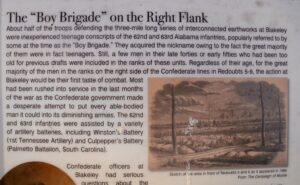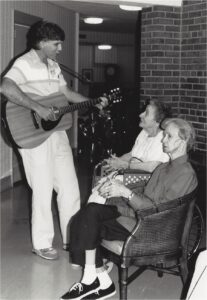
Music engaged dementia patients
She put her hand on my knee. I fed her a few more bites of lunch. Then, she moved her hand to my thigh. I placed it in her lap and said, “Eleonor, let’s keep our hands to ourselves.” She looked at me and said, “I didn’t mean anything by that.”
It was just another day in the memory care unit of the nursing home where I was chaplain for twelve years. I had found a way to minister to those who have dementia. Bible studies did not work because these poor souls could not track such a discussion. I could also bring my guitar and sing gospel songs with them.
Hand-feeding became a ministry tool. My mind went back 30 years to my lunchtimes at the nursing home as I listened to a recent GeriPal podcast titled, Understanding the Variability in Care of Nursing Home Residents with Advanced Dementia.
Avoiding Tube Feeding and Hospitalizations for Advanced Dementia Patients
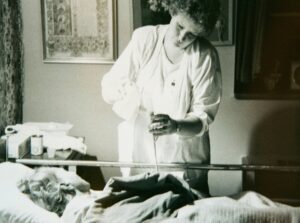
Artificial feeding tube
In their typical entertaining style, the hosts and guests on the podcast discussed the latest research on caring for advanced dementia patients in nursing homes. The researchers wanted to find out the difference between nursing homes that had poor outcomes in the care of the patients and those that did not. The specific outcomes they were looking for were feeding tube use and multiple hospitalizations for advanced dementia patients.
I have written previous blogs about the harmful effects of feeding tube use in advanced dementia patients hereand here. A decline in eating and weight loss is expected in advanced dementia patients. Putting in a feeding tube does not make them live longer and makes their lives so much more miserable.
Likewise, multiple trips to the hospital are a tremendous burden on these patients and do not extend their lives. I previously wrote about my friend whose family refused hospitalization as his dementia advanced. I quoted his wife as the title of my blog, “We didn’t want to put him through that again.”
Good and Bad Outcomes in Nursing Homes
The question for these researchers was, “What are the characteristics of nursing homes that have low feeding tube use and fewer hospital transfers of advanced dementia patients?” They found four differences in the cultures of the facilities with good outcomes as opposed to poor outcomes:
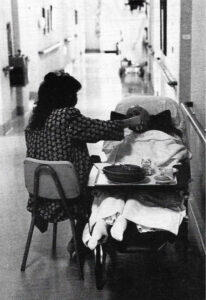
Careful hand feeding
- “We found their physical environment was drastically different; where those with low feeding tube rates had really a rather beautiful physical environment. The other nursing home had wallpaper peeling off the walls and a strong smell of urine.… Every day, they had a different cooking contest so that there was food throughout the facility, and all day long.”
2. “We also saw the decision-making processes were different. Whereas the home with the low rate of feeding tube use involved families in decision making. We didn’t see that in the high rate nursing home.”
3. “We also saw care processes were different. You think the number of staff available to feed people; feeding for people with advanced dementia is very time consuming and takes a lot of hands and a lot of time.”
4. “Then finally, we saw that their implicit values were different. We saw that the nursing home with a low rate of feeding tube use really valued comfort and valued keeping people in the facility.… Whereas the nursing home with the high rate of feeding tube use were more concerned with regulations, making sure that they didn’t get any dings on their surveys, and were really concerned about maintaining people’s weight.”
In my years at the nursing home, I would often go to the memory care unit at lunch and tell the nurses I would like to help feed patients. I clarified, “I don’t want any spitters or chokers.” It became a ministry for me. It turns out, thinking of this podcast, I was helping reduce the use of feeding tubes.
Eleonor was the only flirt I encountered in my years feeding patients. She and all the others deserved just a little time for hand feeding. I was glad to be part of such a caring culture.
_________________________________________
Chaplain Hank Dunn is the author of Hard Choices for Loving People: CPR, Feeding Tubes, Palliative Care, Comfort Measures and the Patient with a Serious Illness and Light in the Shadows. Together they have sold over 4 million copies. You can purchase his books at hankdunn.com or on Amazon.

 I’ve had the opportunity to officiate many funerals over the years. This was supposed to be one of the “easy” ones. The dead man’s family had a relative who once was a member of my church in Vienna, Virginia, back in the day. None of the family attended that church now — or any church. So, when the man died suddenly of a heart attack at 64, they turned to us for a minister to conduct the service — kind of a rent-a-preacher.
I’ve had the opportunity to officiate many funerals over the years. This was supposed to be one of the “easy” ones. The dead man’s family had a relative who once was a member of my church in Vienna, Virginia, back in the day. None of the family attended that church now — or any church. So, when the man died suddenly of a heart attack at 64, they turned to us for a minister to conduct the service — kind of a rent-a-preacher.
 Recently,
Recently,  Then, of course, “happy” is
Then, of course, “happy” is 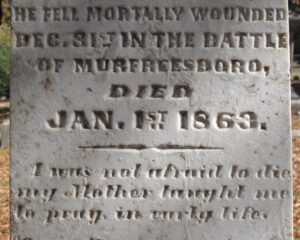 Recently, I
Recently, I 

 FORT BLAKELEY, ALA. March 1, 2022: What if your teenage son went off to war — fought in one battle — died in that battle — and then you find out his death was actually after the war had ended — AND your side lost the war? Today, we would say parents of these dead soldiers would have complicated grief. Indeed.
FORT BLAKELEY, ALA. March 1, 2022: What if your teenage son went off to war — fought in one battle — died in that battle — and then you find out his death was actually after the war had ended — AND your side lost the war? Today, we would say parents of these dead soldiers would have complicated grief. Indeed.